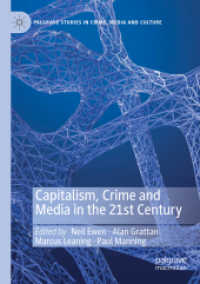Full Description
Hadrianus Junius (1511-1575) is generally regarded as the greatest humanist in the Northern Netherlands between the death of Erasmus in 1536 and the foundation of Leiden University in 1575. For both literary authors and professional philologists of the Golden Age, Junius remained the only significant point of reference on Dutch soil in the second and third quarters of the sixteenth century. As physician, lexicographer, historiographer, emblematist, poet, mycologist, chronologer and philologist, he was a prolific editor (and translator) of Latin and Greek texts. Yet we still know little about the kind of scholarship this stuttering polymath pursued, and about the connections between his numerous works. The chapters in this book analyse Junius' most important works, some of which have never been studied before. All chapters contextualise his works in light of the tradition of humanism so familiar to Junius.
Contents
Acknowledgements
List of illustrations
Introduction: Hadrianus Junius and Northern Dutch Humanism, Dirk van Miert
From Erasmus to Leiden: Hadrianus Junius and his Significance for the Development of Humanism in Holland in the Sixteenth Century, Chris Heesakkers
Hadrianus Junius' Batavia and the Formation of a Historiographical Canon in Holland, Coen Maas
Context, Conception and Content of Hadrianus Junius' Batavia, Nico de Glas
Hadrianus Junius' Animadversa and his Methods of Scholarship, Dirk van Miert
Junius' two editions of Martial's Epigrammata, Chris Heesakkers
A Man of Eight Hearts: Hadrianus Junius and Sixteenth-Century Plurilinguism, Toon Van Hal
Devices, Proverbs, Emblems: Hadrianus Junius' Emblemata in the Light of Erasmus' Adagia, Ari Wesseling†
Emblematic Authorization - Lusus Emblematum: the Function of Hadrianus Junius's Emblem Commentary and Early Commentaries on Alciato's Emblematum libellus, Karl Enenkel
Epilogue: The Kaleidoscopic Scholarship of Hadrianus Junius, Dirk van Miert
About the Contributors
Index of Names








